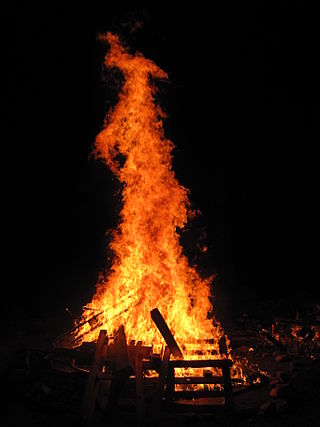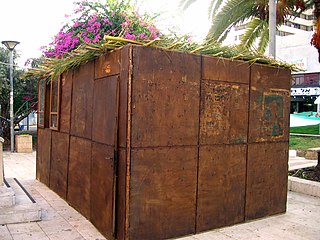Related Research Articles

The Mishnah or the Mishna is the first written collection of the Jewish oral traditions that are known as the Oral Torah. It is also the first work of rabbinic literature, with the oldest surviving material dating to the 6th to 7th centuries BCE.

Meir David HaKohen Kahane was an American-born Israeli Orthodox ordained rabbi, writer, and ultra-nationalist politician who served one term in Israel's Knesset. Founder of the Israeli political party Kach—whose legacy continues to influence militant and far-right political groups active today in Israel,—he was convicted of multiple acts of terrorism in the United States and in Israel.

The Tosefta is a compilation of Jewish Oral Law from the late second century, the period of the Mishnah and the Jewish sages known as the Tannaim.

Rabbinic literature, in its broadest sense, is the entire spectrum of works authored by rabbis throughout Jewish history. The term typically refers to literature from the Talmudic era, as opposed to medieval and modern rabbinic writings. It aligns with the Hebrew term Sifrut Chazal, which translates to “literature [of our] sages” and generally pertains only to the sages (Chazal) from the Talmudic period. This more specific sense of "Rabbinic literature"—referring to the Talmud, Midrashim, and related writings, but hardly ever to later texts—is how the term is generally intended when used in contemporary academic writing. The terms mefareshim and parshanim almost always refer to later, post-Talmudic writers of rabbinic glosses on Biblical and Talmudic texts.
According to Jewish tradition, the Torah contains 613 commandments. This myth is first recorded in the 3rd century CE, when Rabbi Simlai mentioned it in a sermon that is recorded in Talmud Makkot 23b. Other classical sages who hold this view include Rabbi Simeon ben Azzai and Rabbi Eleazar ben Yose the Galilean. It is quoted in Midrash Exodus Rabbah 33:7, Numbers Rabbah 13:15–16; 18:21 and Talmud Yevamot 47b. The 613 commandments include "positive commandments", to perform an act, and "negative commandments", to abstain from an act. The negative commandments number 365, which coincides with the number of days in the solar year, and the positive commandments number 248, a number ascribed to the number of bones and main organs in the human body.

Iyar is the eighth month of the civil year and the second month of the Jewish religious year on the Hebrew calendar. The name is Babylonian in origin. It is a month of 29 days. Iyar usually falls in April–May on the Gregorian calendar.

The Jerusalem Talmud or Palestinian Talmud, also known as the Talmud of the Land of Israel, is a collection of rabbinic notes on the second-century Jewish oral tradition known as the Mishnah. Naming this version of the Talmud after Palestine or the Land of Israel—rather than Jerusalem—is considered more accurate, as the text originated mainly from Galilee in Byzantine Palaestina Secunda rather than from Jerusalem, where no Jews lived at the time.
Daf Yomi is a daily regimen of learning the Oral Torah and its commentaries, in which each of the 2,711 pages of the Babylonian Talmud is covered in sequence. A daf, or blatt in Yiddish, consists of both sides of the page. Under this regimen, the entire Talmud is completed, one day at a time, in a cycle of approximately seven and a half years.

Yehuda Meir Shapiro was a prominent Polish Hasidic rabbi and rosh yeshiva, also known as the Lubliner Rav. He is noted for his promotion of the Daf Yomi study program in 1923, and establishing the Chachmei Lublin Yeshiva in 1930.
Elisha ben Abuyah was a rabbi and Jewish religious authority born in Jerusalem sometime before 70 CE. After he adopted a worldview considered heretical by his fellow Tannaim, the rabbis of the Talmud refrained from relating teachings in his name and referred to him as the "Other One". In the writings of the Geonim this name appears as "Achor" ("backwards"), because Elisha was considered to have "turned backwards" by embracing heresy.

Hakham is a term in Judaism meaning a wise or skillful man; it often refers to someone who is a great Torah scholar. It can also refer to any cultured and learned person: "He who says a wise thing is called a Hakham, even if he be not a Jew." Hence, in Talmudic-Midrashic literature, wise gentiles are commonly called hakhmei ummot ha-'olam . In Sephardic usage, hakham is a synonym for "rabbi".

The Seleucid era ("SE") or Anno Graecorum, sometimes denoted "AG," was a system of numbering years in use by the Seleucid Empire and other countries among the ancient Hellenistic civilizations, and later by the Parthians. It is sometimes referred to as "the dominion of the Seleucidæ," or the Year of Alexander. The era dates from Seleucus I Nicator's reconquest of Babylon in 312/11 BC after his exile in Ptolemaic Egypt, considered by Seleucus and his court to mark the founding of the Seleucid Empire. According to Jewish tradition, it was during the sixth year of Alexander the Great's reign that they began to make use of this counting. The introduction of the new era is mentioned in one of the Babylonian Chronicles, The Chronicle of the Diadochi.
Rabbi Meir was a Jewish sage who lived in the time of the Mishnah. He was one of the Tannaim of the fourth generation (139-163). He is the third most frequently mentioned sage in the Mishnah and is mentioned over 3,000 times in the Babylonian Talmud. His wife Bruriah is one of the few women cited in the Gemara.

Sukkah is a tractate of the Mishnah and Talmud. Its laws are discussed as well in the Tosefta and both the Babylonian Talmud and Jerusalem Talmud. In most editions it is the sixth volume of twelve in the Order of Moed. Sukkah deals primarily with laws relating to the Jewish holiday of Sukkot. It has five chapters.

In the Hebrew Bible, Melchizedek, also transliterated Melchisedech, Melchisedec or Malki Tzedek, was the king of Salem and priest of El Elyon. He is first mentioned in Genesis 14:18–20, where he brings out bread and wine and then blesses Abram, and El Elyon or "the Lord, God Most High". Abram was returning from pursuing the kings who came from the East and gave him a "tenth of everything".
Nathan the Babylonian, also known as Rabbi Nathan, was a tanna of the third generation.

Tanna Devei Eliyahu is the composite name of a midrash, consisting of two parts, whose final redaction took place at the end of the 10th century CE. The first part is called "Seder Eliyahu Rabbah" ; the second, "Seder Eliyahu Zuṭa".
Aaron ben Meïr was a rabbi and a Nasi of the Gaonate in the first half of the tenth century. His name was brought to light by several fragments discovered in various genizoth. The fragments contain an account of a controversy between Ben Meïr and the Talmudic Academies in Babylonia regarding the Hebrew calendar.
Rabbah b. Shela was a Babylonian rabbi of the 4th century.

Isaac ben Melchizedek, was a rabbinic scholar from Siponto, Italy, and one of the first medieval scholars to have composed a commentary on the Mishnah, of which only his commentary on Seder Zera'im survives. Elements of the Mishnaic order of Taharot are also cited in his name by the Tosafists, but the complete work is no longer extant.
References
- ↑ Raphael Halperin (1985). Aṭlas ʻets-ḥayim. Heḳdesh Ruaḥ Yaʻaḳov. p. 203. Retrieved 30 August 2011.
- ↑ Nachman Zevi Getzow (1878). על נהרות בבל. בדפוס מ. לוינסקי. p. 105. Retrieved 30 August 2011.
- ↑ Mishnah Bava Metziah 7:9